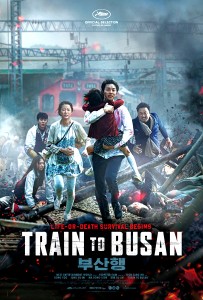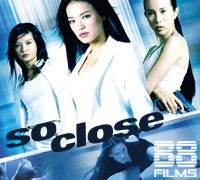Director: Yeon Sang-Ho
Writer: Park Joo-suk
Cast: Gong Yoo, Ma Dong-Seok, Jung Yu-Mi, Choi Woo-Sik, Ahn So-Hee, Kim Soo-Ahn
Running Time: 118 min.
By Paul Bramhall
Korea’s film industry is one which is rarely associated with the medium of animation, however one name that may change all that is director Yeon Sang-ho, who’s been successfully carving out a name for himself within the animated arena. His hard hitting features like King of Pigs and The Fake, which display a biting social commentary towards modern day Korea, have drawn international acclaim, and were widely screened on the festival circuit. Sang-ho ventured outside the realistic trappings of his most recognised work for the 2015 feature Seoul Station, which deals with a zombie outbreak in the Korean capital, and a year later he followed it up with an immediate sequel in the form of Train to Busan.
What makes Train to Busan a unique sequel is that, instead of being animated, it’s a live action follow-up. Similar to Hollywood director Brad Bird, who after rising to prominence with the likes of The Incredibles decided to take on live action with Mission Impossible: Ghost Protocol, so fans of Sang-ho have also been looking forward to seeing the director work on a live action production. The fact that his first foray was to involve Korea being overrun by a zombie outbreak was a welcome bonus.
Rather than drawing on comparisons to other zombie flicks though, the movie that immediately springs to mind when watching Train to Busan is fellow Korean director Bong Joon-ho’s Snowpiercer. Despite one revolving around an outbreak of the undead, and one being a futuristic vision of humans surviving on a train in an earth which has frozen over, both share the same thematic overtones and setting. Far from being a visceral thrill ride of an undead bloodbath, Sang-ho has constructed a tale which is more about the invisible divides that exist between the social classes, the members of whom are very much alive.
As expected, proceedings unfold which see a group of survivors on a train travelling from Seoul, located in the north of South Korea, travelling to Busan, a coastal city in the South. Gong Yoo plays the main character, most recognizable as the lead from the 2013 action movie The Suspect. His character is that of a stereotypical salary man, one who is so involved in his work that he’s already divorced, with a young daughter that wants to go and stay with her Mum in Busan. For his daughter’s birthday, he agrees to take her to Busan to meet her mother, until of course events get interrupted by a zombie outbreak.
The cast of characters who convene to form the group of survivors are like a who’s who of disaster movie archetypes – we have the good hearted working class couple, played by Ma Dong-seok (the stocky muscular guy from any Korean movie made within the last 10 years) and Jeong Yu-mi. There’s a slimy middle aged business man who’ll happily sacrifice others to save himself played by Kim Eui-seong, a faithful train driver, a pair of old ladies, a teenage couple, and a homeless guy just for good measure.
Sang-ho wastes no time getting down to business, and within 15 minutes we’re already on the train watching events unfurl, as a stray zombie who managed to get on-board just before it pulls away from the platform begins to wreak havoc. For the remainder of the almost 2 hour runtime, we stay within the confines of the train, or never far from it. As a result of almost 75 minutes being spent in train carriages, there are times when the action begins to strain. At the end of the day, its zombies on a train, and as expected, most of the tension is wringed from the survivors frantically dashing from one carriage to the other, closing the door seconds before a horde of the undead pile up in pursuit. It’s initially effective, but by the umpteenth time we see it, all sense of danger has effectively dissipated.
Sang-ho’s script also makes the most interesting characters the supporting ones. Gong Yoo’s fund manager who doesn’t have time for his family is as dull as dishwater, despite being the main character. Before the first five minutes are over, it’s obvious that he’s going to take the train with his daughter, be put in peril, and realise that family is more important than work. It’s a cliché that’s been recycled time and time again in Korean cinema, and both the script and Yoo’s bland performance add nothing new to it. Dong-seok’s dedicated husband on the other hand stands out, both relatable and willing to do anything to protect his heavily pregnant wife, he easily steals the show whenever he’s onscreen.
One of the best scenes has Dong-seok round up Yoo and a teenage baseball player, to single handedly fight their way through several carriages of zombies, in order to get to a group of stranded passengers further down the train. Watching his burly frame punch and wrestle though several waves of the undead almost makes you wish that he was the main character, and it’s certainly a breath of fresh air to see zombies being dispatched with plain old brute force rather than the traditional bullet in the head. However for those checking in hoping to see a Korean version of Dawn of the Dead, those expectations should be adjusted accordingly. Despite several victims falling prey to the zombies insatiable appetite, Train to Busan feels like a tame affair when it comes to violence, with very little imagination shown when it comes to the nitty gritty of zombies doing what they do best.
Indeed it seems that rather than going for visceral thrills, Sang-ho is more interested in using the outbreak as a plot device in which to frame his commentary on the questionable decisions of those in authority. There’s been a number of Korean movies of late which take swipes at the countries government, a prime example being the excellent Inside Men, and Train to Busan also comes with a message for its audience. The issue is that it’s not a subtle one, and the moments when Sang-ho’s script wants to say something, it does so in a way which sticks out like a sore thumb. A newsreader announces “We must keep calm and trust the government” over images of a burning cityscape, and in another scene an employee, who knows the orders he received will condemn people to certain death, questions that it’s not his fault if he’s just doing what he’s told to do.
The lack of imaginative violence, social commentary, and a particularly awkward change in tone that switches to a melodramatic finale, all point to Sang-ho looking to appeal to as wide an audience as possible. The problem is that when you want to appeal to such a broad audience, a movie can easily lose its identity. To a degree that seems to be the main issue with Train to Busan. Is it a Korean zombie flick? Is it a scathing commentary on those in authority? Is it the tale of a father and daughter reconciling their relationship? Sang-ho has tried to make it all of those things, and it doesn’t quite succeed at being any of them, at least not in a way which effectively connects with those watching.
The zombies don’t feel scary enough, the characters aren’t fleshed out enough, and the swipes at the authorities aren’t subtle enough. With that being said, it’s unfair to write off Train to Busan as a bad movie. It’s not, and to Sang-ho’s credit it remains watchable throughout, even if by the end it has worn out its welcome ever so slightly. As a first foray into live-action, Sang-ho hasn’t quite hit the mark, but his talent is still very much on display, with the distinct visual style present in his animated productions successfully carried over into a live action environment. Next time, hopefully he’ll return with a sharper and more focused script, and when that happens I’ll be more than happy to buy a return ticket. But for now, Train to Busan is thankfully just a one-way trip.
Paul Bramhall’s Rating: 6/10





Great stuff, Paul!
This one is on my list of things to see. I like train movies. I don’t know why that is and I’m not sure if it even qualifies as a sub-genre. Maybe it’s the feeling of being caged in while also rushing past the world outside the window, like a claustrophobia thriller on-the-go… or maybe it’s just a love for films like Strangers on a Train, From Russia with Love, Murder on the Orient Express, etc. But anyway. The trailers for Train to Busan piqued my interest. Looked like a cool horror movie with a fast-pace… but it sounds like it doesn’t quite live up to the promise of the promos. Too bad. I’ll still keep an eye out for it, though. Good review, as always. I hadn’t realized until reading this that Train to Busan was related to an animated feature!
“I like train movies.” – My favorite line of 2016 so far! 😛 Thanks Kyle, I’d still recommend checking it out if you’re a fan of both trains and zombies, for me though I couldn’t shake the feeling that it’s a movie that was holding back in order to have a wider appeal. It’s a concept that had the potential to go for the jugular, and perhaps Sang-ho thought it did, but sadly it wasn’t packing any teeth.